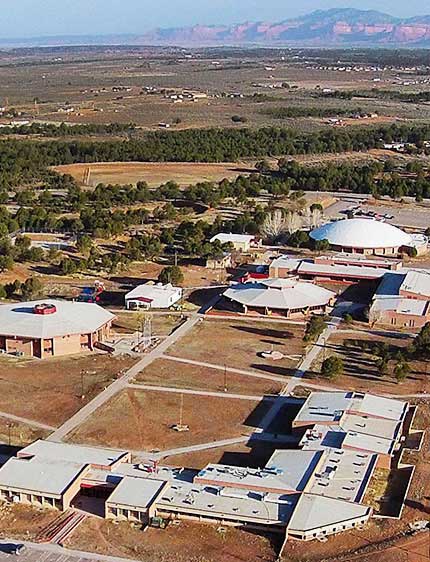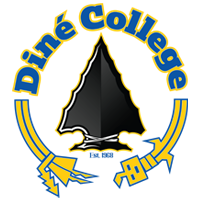Who We Are
Diné College is the first tribally controlled and accredited collegiate institution in the United States. Established in 1968 as Navajo Community College, it was later renamed Diné College. The Navajo Nation sought to create an institution of higher education that encouraged Navajo youth to become contributing members of the Navajo Nation and the world.

About Diné College
Under the direction of an eight-member Board of Regents, appointed by the Navajo Nation President and confirmed by the Health Education and Human Services Committee of the Navajo Nation Council, the College continues its goals for student success.
Today, Diné College serves a predominantly Navajo student population across the 27,000 square miles of the Navajo Nation that spans across the states of Arizona, New Mexico, and Utah. The College offers General Education courses that provide students with a high-quality experience while earning various Certificate as well as Associate and Bachelor degree programs in the areas important to the economic, political, environmental, and social development of the Navajo Nation.
Mission
Rooted in Diné language and culture, our mission is to advance quality post-secondary student learning and development to ensure the well-being of the Diné People.
Diné bina’nitin t’áá íiyisíí á siláago binahjį’, ołta’í na’nitin náasjį’ yee ínááhwiidooł’áłígíí yéego bidziilgo ádiilnííł, áko Diné nilínígíí t’áá ałtso yá’át’éehgo bee bił nahaz’áa dooleeł niidzin.
Vision
Our vision is to improve continuously our programs and services to make Diné College the exemplary higher education institution for the Diné People.
Nihi’ólta’gi, Diné Bidziilgo ólta’gi na’nitin ał’ąą ádaat’éii ółta’í bee nanitinígíí dóó t’áá ha’át’íí shíí bee bíká’aná’álwo’ígíí bidziilgo dóó bohónéedzą́ ągo ádiilnííł niidzin. Díí binahjį’ Diné bi’ólta’gi óhoo’aah ts’ídá bohónéedzáanii bee bił haz’ą́ ílįį dooleeł ́ .
- Quality Growth for Navajo People: Serve student and community interests by implementing programs, projects, and initiatives through investments to ensure quality return for nation-building that are sustainable, diverse, equitable, and inclusive.
- Language & Culture: Increase accessibility to Navajo language and culture for people living within and beyond Diné Bikéyah through innovative programming and strategies.
- Research: Support faculty, staff, and students as they redefine Tribal research, increase institutional research capacity, and advance the research agenda of the institution and Navajo Nation by respecting digital humanity and social justice.
- Teaching and Learning: Build Navajo Nation human capacity through undergraduate and graduate academic programs, as well as certificates, continuing education, and specialized training.
- Accessibility: Provide accessible and quality education and campus resources to current, former, and prospective students living within and beyond Diné Bikéyah.
- Easing Access: Ensure services to increase student participation and success by eliminating barriers and streamlining processes.
- Dynamic Learning: Provide equitable instruction and support to improve learning outcomes to ensure student success, whether face-to-face or online.
- Student Outcomes: Expand our shared investment for student success by creating and promoting equitable services and campus resources to institutional departments.
- Campus Health & Wellness: Strengthen, reinforce, and increase student and employee engagement in health and wellness.
- Networking: Build and expand partnerships to promote campus wellness and increase productivity and performance.
- Co-curricular Activities: Create a safe, holistic, healthy environment with resources to reduce risk and harm related to mental, physical, emotional, and spiritual health and safety through prevention and intervention.
- Financial Health: Strengthen financial health and ensure financial stability to support institutional growth.
- Holistic Integration: To integrate Diné Education model that offers a versatile curriculum, contemplative instruction, and dedicated assessment to provide solutions and facilitate efforts to deal with the challenges we face today.
- Community of Practice: Create a college community that comes together to share, guide, and review the College’s academic progress, instruction and assessments for continuous improvement.
- Mentoring Network: Fabricate a stakeholder network to ensure Diné Education Philosophy is integrated into programs, curriculum, and administration by deploying mentors throughout the college to provide the expertise needed.
- Data-Informed Decision Making: Cultivate a data-informed culture to practice and analyze programs and facilities in order to create clarity and accountability.
- Culture and Environment: Building K’é (Kinship) through the fundamental Diné principles of Ahił ídlį (Respect), Baa nitsáhákees (Reflect), K’éhwiindzin (Relationally), and Aná’álwo’ (Reciprocity) to uphold accountability.
- Integrate K’é: Cultivate a cohesive, engaging, and supportive student-centered work and learning organization through K’é.
- Lifelong Learning: Advocate lifelong learning to improve institution’s organizational structure culturally, technologically, socially, and professionally.
- Global Community: Strengthen and expand partnerships through global networking that create opportunities for the well-being of our communities.
- Facilities: Provide infrastructure, facilities, and support staff that meet our expansion utilizing Diné cultural standards and values, fostering energy efficiency and sustainability.
- Facility Planning: Enhance campus community experience with academic planning to expand and create educational facilities and innovative learning spaces for the institution in serving the Navajo Nation and beyond.
- Sustainability through Renewables: Reduce environmental impact and implement renewable energy policies to develop and support the evolving needs of the campus community and ensuring business continuity.
- Maintain Current Facilities: Provide responsive, and timely maintenance services aligned with campus operational needs to include emergency preparedness.
College Principles
Our educational principles are based on Sa’ah Naagháí Bik’eh Hózhóón, the Diné traditional living system, which places human life in harmony with the natural world and universe. The system provides for protection from the imperfections in life and for the development of well-being. The principles are four-fold:
- Nitsáhákees. Thinking. Baa nitsídzíkees. Apply the techniques of reasoning. Analyze alternative solutions through the use of the principles of logic and creativity.
- Nahat’á. Planning. Nahat’á anitsíkees bee yáti’ dóó ííshjání óolzin. Develop and demonstrate communication skills. Nahat’á nahaaldeel. Demonstrate systematic organization skills.
- Iiná. Implementation. T’áá hó ’ájí t’éego hozhoogo oodáál. Demonstrate self-direction based on personal values consistent with the moral standards of society. T’áá hó ’ájí t’éego hózhóogo oodáál. Demonstrate quality, participation, work, and materials.
- Siihasin. Reflection and assurance. Siihasingo oodáál. Demonstrate competency. Siihasin nahaaldeel. Demonstrate confidence.
College Values
Our employees and students will adhere to the following values to achieve the mission and purposes of the College
- T’áá hó ’ájí t’éego. Excellence and self-initiative in problem-solving, compassion, setting clear goals, and establishing positive working relationships.
- Ahil na’anish. Cooperating and helping one another, keeping all employees well informed, using proper language for communication, respecting one another on equal terms, and honoring K’é.
- Il ídlí. Respecting the cultural, racial, and gender diversity of the Diné People, maintaining safe, courteous, respectful, and positive learning environments, and valuing inclusiveness.
- Il ééhózin. Understanding, thoughtfulness, competence, confidence, conscientiousness, and reflectivity for serving the needs of the Diné People.
Accreditation
Diné College is accredited by the Higher Learning Commission of the North Central Association of Colleges and Schools, 230 South LaSalle Street, Suite 7-500, Chicago, IL 60604-1411, (800) 621-7440, www.hlcommission.org.
View our Organizational Chart
ADMINISTRATION
President
Dr. Charles “Monty” Roessel
(928) 724-6670
cmroessel@dinecollege.edu
Provost
Dr. Alysa Landry
(928)724-6814
alandry@dinecollege.edu
Vice President of Finance and Administration
Bo Lewis
(928) 724-6677
bolewis@dinecollege.edu
Vice President of Student Success
Glennita Haskey
(928) 724-6860
ghaskey@dinecollege.edu
Director of External Campuses
Winifred Jumbo (B.A., Brown University)
(505)368-3522
wbjumbo@dinecollege.edu
